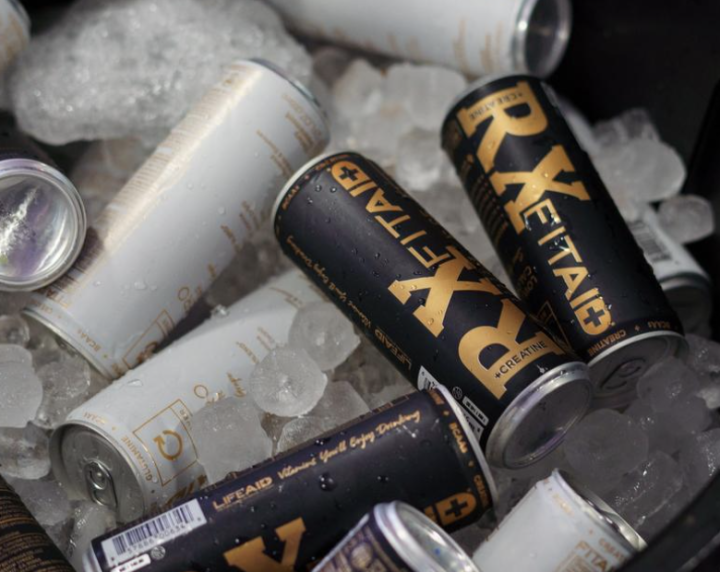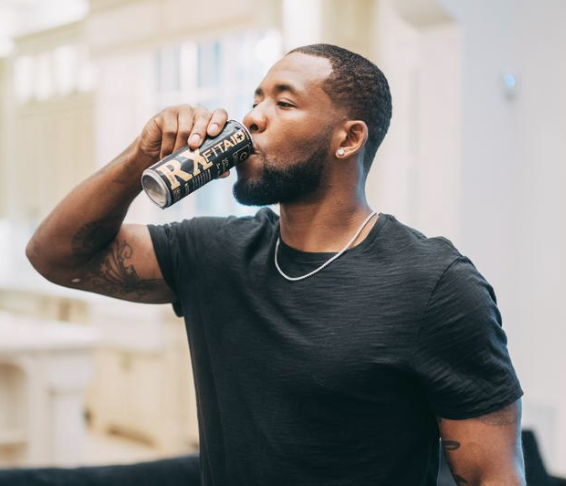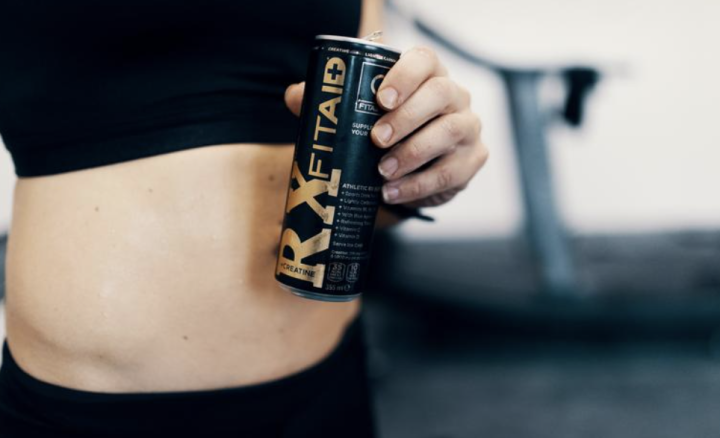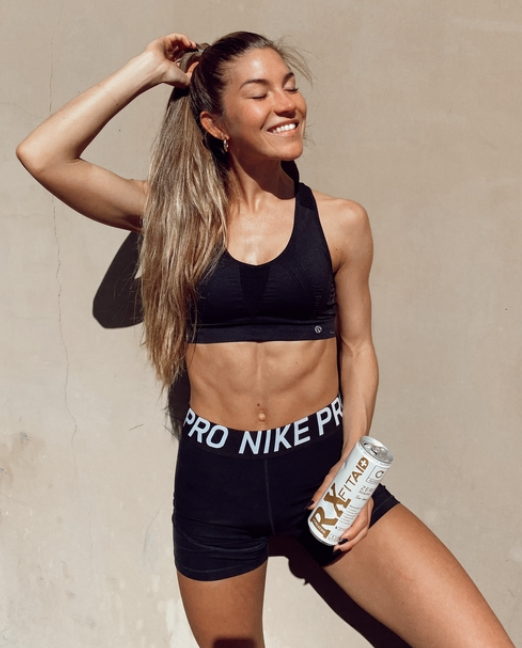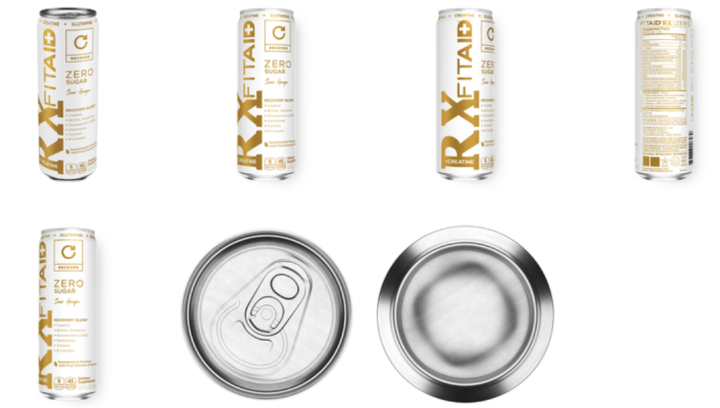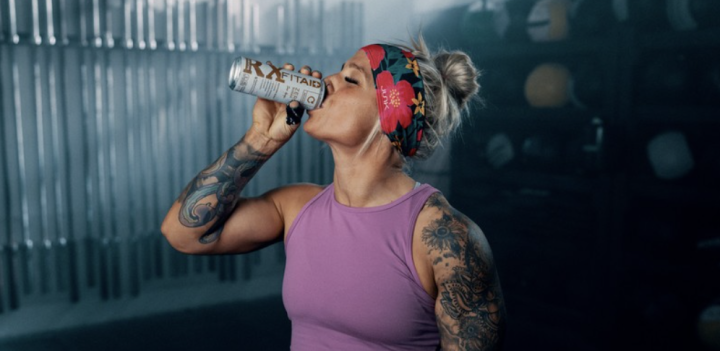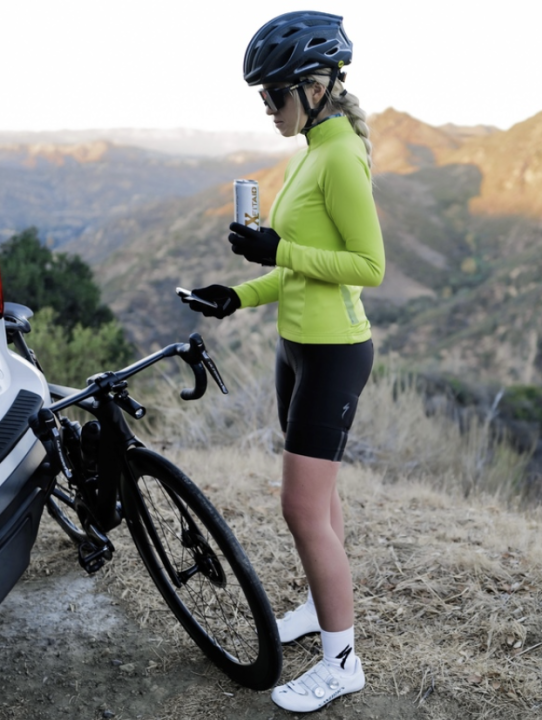The Best Drink Before Bed: DREAMAID GO!
How many mornings have you spent reaching for the snooze button because you didn’t get enough sleep the night before? Is your whole mood thrown off when you wake up feeling tired? This is an all-too-common occurrence for most adults.
Did you know that the Centers for Disease Control and Prevention reports that nearly 33% of all adults in the United States are not getting enough sleep every day? The reasons for this can vary greatly from one person to another, but it doesn’t change the fact that too many people are struggling with sleep.
While coffee and energy drinks can be a miracle cure for sleepless nights, they don’t address the problem at the source. They only Band-Aid it. To feel more energized, you must focus on not just getting more sleep but also getting better quality sleep.
We know this is easier said than done, but when you take the time to understand the reasons behind your sleep deprivation, you can find the right solution. There are currently several ingredients that can set you up for success if you take them before bedtime, and we’re going to take a look at all of them.
In this specific blog, we’re going to dive deep into the ways you can wake up feeling refreshed. Not only will we discuss the ingredients that benefit an individual's sleep quality, but we will also compare some of the most popular bedtime drink options so you can find the best drink before bed. We encourage you to keep reading to learn more.
Reasons for Sleep Deprivation
Unfortunately, the list of sleep disruptors is long. Many different factors can impact people in unique ways. While some individuals might not be affected by certain life events or habits, other people may struggle to get to sleep. Falling asleep is only half the battle, however.
There are several reasons that people may find themselves waking up in the middle of the night. The following are just a few of the most common reasons for difficulty falling or staying asleep:
Stress
If there is one thing for certain, it is that there is no shortage of reasons for people to feel stressed. Global events, finances, relationships, and responsibilities can all leave you feeling overwhelmed and worried. The majority of people would agree that stress is one of the things that keep them up at night.
What is it about stress that makes it so hard to sleep? Instead of peacefully drifting off to dreamland, your mind is constantly running and worrying. This makes it challenging to fall asleep, and in serious cases, it can lead to insomnia. The irony is that a lack of sleep can lead to more stress, which may cause further sleep disruptions.
Travel or Work Schedules
If you are someone who travels a lot or works different shifts, you may find that your body’s internal clock has trouble adjusting to the constant changes. Once your circadian rhythm has been disrupted, it can be hard to get back on track, especially if there is no sign of you getting back to a normal schedule anytime soon.
Not only does this shift impact your sleep-wake cycle, but it can also lead to changes in your body’s temperature and metabolism. If you suffer from jet lag often, it can eventually turn into insomnia. The same can be said for individuals who work the swing shift at work.
Bad Sleep Habits
Sometimes, these sleep disruptors are beyond our control, but there are many things that we do to ourselves that can make it challenging to get a restful night's sleep. These poor sleep habits can range from spending too much time scrolling on the phone in bed or simply staying or going to bed at irregular times every night.
Some people also find that taking naps during the day makes it challenging to fall asleep at night. It’s important to evaluate your habits to see what could be keeping you up at night.
Eating Too Much Before Bed
Life can get busy, and it might be difficult to have dinner at a reasonable hour, but eating a large meal right before you head to bed could be causing your sleep struggles. Certainly, a small snack is okay, but eating too much can make you uncomfortable when you go to lie down at night.
You could even end up with heartburn when your food and stomach acid backflow into your esophagus. The pain and discomfort from this can keep you up later than you had planned.
Medical Circumstances
Finally, there is a long list of medical reasons why someone may not be getting enough rest. Certain medications are known to cause sleeplessness, and some mental health disorders may also lead to insomnia. Even hormonal changes can make it difficult to get a full night’s rest.
Other medical conditions that impact sleep include:
- Asthma
- Allergies
- Cancer
- Chronic Pain
- Diabetes
- Heart Disease
- Overactive Thyroid
- Parkinson’s Disease
- And More!
Benefits of Better Sleep

If you are not regularly getting at least seven or more hours of good sleep, then you’ve probably noticed many changes in your body. Sleep is important for several reasons, and without it, your body can’t function at its best. While these changes might be minor at first, they can increase over time.
Eventually, you may just surrender to the idea that this is your new normal, but you don’t have to. There are many benefits to getting better sleep. When you take steps to improve both the quality and amount of sleep in your daily routine, you can expect to enjoy many benefits!
Ways to Improve Sleep Quality
By now, you know how important it is to get plenty of good quality rest every night, but you might be wondering how it’s done. Most people don’t actively choose to have trouble sleeping, so it’s going to take a decent amount of effort on your part to make sure that you can improve the quality of your sleep.
Fortunately, there are a few habits that you can start to work into your daily routine that are shown to help adults get to sleep and stay asleep. Consider the following:
- Establishing a Sleep Schedule: You can get your body’s circadian rhythm into a solid schedule by consistently going to bed at the same time every night. You should then wake up at the same time every morning so that you get the same amount of sleep each night. Though it might be tempting to sleep in on weekends, this can throw off the schedule and put you back to square one.
- Creating a Peaceful Environment: You must create a space that is relaxing if you want to fall asleep easily. Removing anything that creates disruptive sounds and setting the room at a comfortable temperature are some examples. You should also make sure the room is dark, so you may have to remove TVs, computers, or smartphones.
- Avoiding Large Meals & Bad Drink Choices: As you already know, large meals should be skipped before bedtime. If you are hungry, opt for a light snack. You should even be careful about what you drink before bed. Caffeine is not a good choice, but you should also avoid alcohol as it may cause difficulty sleeping.
- Get Active During the Day: Finally, you should consider making some lifestyle changes during the day as well. Adding exercise to your routine can help you fall asleep faster at night because it makes you tired. Don’t be tempted to give into a post-workout nap, however. This can cancel out the workout and still leave you struggling to fall asleep at night.
Ingredients to Help You Fall Asleep
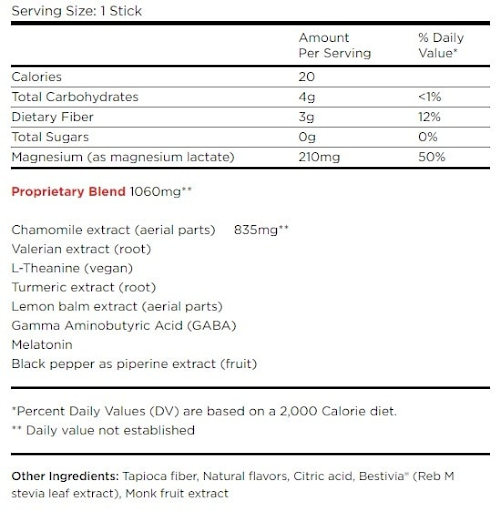
While those lifestyle changes are a great way to promote a good night’s sleep, there are some dietary changes you should make as well. Specifically, there are key ingredients that you will want to add to your routine if you want to set yourself up for improved sleep quality.
Whether you want to take them in a supplement, drink, or other forms, we strongly recommend that you seek out the following ingredients that have been shown to help people fall asleep and stay asleep:
Melatonin
Your brain naturally produces the melatonin hormone when it is dark. It helps you to fall asleep and maintains your circadian rhythm. Being exposed to too much light before or during sleep can prevent your brain from producing melatonin, and you’ll have difficulty falling asleep.
Fortunately, you can make up for this lack of production by adding melatonin to your diet. It is available in sleep aids, but it can also be found in drinks and foods, like eggs and fish.
Chamomile
If you mainly struggle to fall asleep even when you’re tired, you may also want to consider calming yourself down with some chamomile tea. For years, people have been using this ingredient to help treat their insomnia because it is believed to produce a sedative effect on consumers.
The plant contains apigenin, which can bind to the brain’s benzodiazepine receptors. The result makes you feel sleepy and ready for bed.
Valerian Root
Valerian is a flowering plant found in grasslands, but the root is where the magic is found. Several scientists have been studying the effect that valerian root has on sleep, and multiple researchers conclude that it can both speed up the amount of time it takes you to fall asleep and it can improve sleep quality.
What Drinks Help You Good Night’s Rest?

Just because you shouldn’t eat a full meal before bed doesn’t mean that you shouldn’t have a drink. Drinking the right drink before bed can be a great way to get those powerful ingredients that we just mentioned. Several other types of beverages have been known to produce similar calming effects.
The following are just a few of the best drinks to have before going to bed:
- Dreamaid
- Warm Milk
- Tart Cherry Juice
- Herbal Teas
- Banana Smoothie
- Pure Coconut Water
- Water
- Almond Milk
As we already covered, you’ll want to avoid anything that has caffeine. This can make it difficult when choosing the right tea, but there are still plenty of non-caffeinated herbal tea options available.
Many people are surprised that alcohol is on the list of drinks to avoid because it’s known to make you drowsy. Though it might make it easy to fall asleep, it doesn’t produce good quality sleep. Instead, it can have negative effects on your sleeping pattern, and heavy drinking can eventually lead to insomnia. Therefore, this is not the best drink before bed.
Do Some Drinks Before Bed Help You Have Good Dreams?
If you frequently have nightmares, you might find yourself waking up more often throughout the night. In these situations, you might be looking for a magic solution that can send you to bed with sweet dreams. Though there are some different things people claim you can do to help with dreams, there isn’t a special drink, unfortunately.
The best solution you can try is to focus on drinks that are known to help calm you down before sleeping. A lot of nightmares may be caused by stress and anxiety, so the more you can relax before going to bed, the less likely you will have a scare.
You’ll specifically want to look for drinks that have melatonin, chamomile, and lemon balm, to name a few. However, you aren’t completely limited to teas. Some other specialty drinks are designed to help with sleep quality. We’ll get more into those next.
The Best Drink Before Bed for Improved Sleep Quality

At LIFEAID, we’ve become known for creating effective energy drinks, so you might think it would be counterintuitive to create a sleep drink. However, we know that the ultimate key to staying energized is making sure that you are getting plenty of good sleep every night.
It’s important to note that this is not a bottled beverage. We sell this formula as a convenient powder pack that can be mixed into your favorite water bottle. Many customers love these powders because they are convenient to take on the go. If you travel a lot for work or pleasure, this sleep drink can help you to maintain your sleep schedule.
The goal of DREAMAID GO is to help customers reach a calm, cozy place before drifting off into a restorative slumber. We hand-selected the ingredients to assist you in falling asleep faster and staying asleep longer so that you can wake up feeling completely refreshed and ready to go. Best of all, it’s not a habit-forming sleep aid, and it is a more clean alternative to many medications.
We know this all sounds too good to be true, but this is all possible thanks to our special combination of:
- Melatonin
- Chamomile
- Valerian
- Lemon Balm
- GABA
Want more reasons to love DREAMAID GO?
This product is naturally sweetened to taste like tranquil tangerine, so you still get a lovely taste without the extra energy from added sugars. Not to mention, this is a keto-friendly option and comes with only 20 calories.
People especially like that LIFEAID only uses clean, quality ingredients. Everything is picked to boost your health and enhance your lifestyle.
Last but not least, this sleep drink is great for a variety of dietary needs because it is kosher, gluten-free, and doesn’t have any sodium or sucralose.
Find out More About How Drinks Help With Sleep
Are you interested in finding out more about how DREAMAID GO can help you fall asleep faster and get better quality sleep? If so, we encourage you to try the product out for yourself!
It’s easier than ever to start shopping for LIFEAID products. You can buy any of our most popular drinks and powders directly from our website, and you can even sign up for a subscription if you find a product you love. With our monthly subscriptions, you never have to worry about running out of your favorite sleep drink, and you can save money! Not only do we offer 10% off all subscriptions, but you also get free shipping. The best part is that you can cancel your subscription at any time with no penalties, so you have nothing to lose!
Do you still prefer to shop for your favorite beverages in-store? Are you eager to try it and don’t want to wait for shipping? If you answered yes to either question, we have you covered. Many of our products are available in retailers throughout the country. You can find a store nearest to you by using our store locator. It allows you to see which products are carried by each retailer so that you can find a store carrying DREAMAID GO.
With all of the ways we make it easy to get your hands on our sleep drink, you should be off to dreamland in no time at all. Contact Us today if you would like to learn more!
The Best Drink Before Bed: DREAMAID GO! How many mornings have you spent reaching for the snooze button because you didn’t get enough sleep the night before? Is your whole mood thrown off when you wake up feeling tired? This is an all-too-common occurrence for most adults. Did you know that the Centers for Disease […]
Who needs creatine?
You need creatine.
Why Creatine needs to be part of your supplement mix.
For many years, creatine supplementation has been associated with the fitness industry, particularly for bodybuilders and powerlifters. However, recent studies have shown that creatine can be beneficial for anyone who wants to improve their athletic performance, especially men. In this article, we will discuss the science behind creatine and recovery, debunk myths about creatine being just for "meat-heads," and explain how creatine can help optimize fitness and training for men of all ages.
What is Creatine?
Creatine is a natural compound produced in the body that plays a critical role in energy metabolism. It is primarily found in the skeletal muscles and the brain, and it is made from three amino acids: arginine, glycine, and methionine. Creatine supplementation has become increasingly popular among athletes, particularly those involved in high-intensity activities, as it is known to increase muscle strength and endurance.
Does Creatine Really Work?
Several studies have confirmed that creatine supplementation can improve muscle strength and endurance, as well as increase muscle mass. One study published in the Journal of Strength and Conditioning Research found that creatine supplementation improved maximum strength and power output in weightlifters (1). Another study published in the International Journal of Sports Nutrition and Exercise Metabolism found that creatine supplementation improved endurance and muscle recovery in long-distance runners (2).
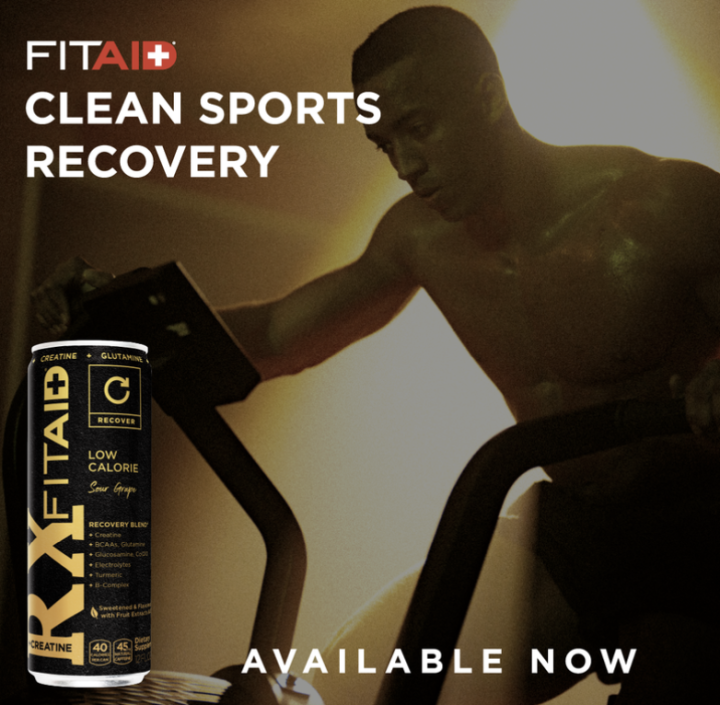
Is Creatine Supplementation Only for People Looking to Bulk Up?
Contrary to popular belief, creatine supplementation is not just for bodybuilders and powerlifters. While creatine can help increase muscle mass, it can also help improve athletic performance in endurance sports, such as running and cycling. Additionally, creatine supplementation can be beneficial for anyone who wants to improve their strength and power output, including older adults.
What is the Science Behind Creatine and Recovery?
During high-intensity exercise, the body relies on ATP (adenosine triphosphate) to provide energy to the muscles. However, the body's ATP stores are limited, and as a result, fatigue sets in. Creatine supplementation can help increase the body's ATP stores, which can improve muscle endurance and delay fatigue. Additionally, creatine supplementation has been shown to reduce muscle damage and inflammation following exercise, which can help speed up recovery time.

How is Creatine Key for Post-Workout Recovery for Men of All Ages?
Creatine is a natural compound that can be found in certain foods, such as red meat and fish. However, it can be difficult to get enough creatine from diet alone, particularly for athletes who have higher energy requirements. By supplementing with creatine, men can increase their muscle strength and endurance, improve their recovery time, and optimize their overall fitness and training.
How to Get More Creatine in Your Diet?
As mentioned earlier, creatine can be found in certain foods, such as red meat and fish. However, it can be challenging to get enough creatine from diet alone, particularly for athletes. The most effective way to increase creatine levels is to supplement with creatine monohydrate. Creatine monohydrate is the most researched form of creatine, and it is considered safe and effective for most people.
FITAID RX Drinks for Post-Workout Recovery:
FITAID RX is a post-workout drink that contains no artificial sweeteners, with no sucralose or aspartame or Ace-K. It has clean caffeine from green tea extract and 1000mg of bonded creatine. FITAID RX comes in two options for sugar content, one sweetened with Raw Organic Agave and the other with monk fruit.
Additionally, FITAID RX contains vitamins and minerals that can help aid muscle recovery, including turmeric, glucosamine, vitamin B12, and BCAAs (bran chain amino acids). BCAAs are a group of essential amino acids that are important for muscle protein synthesis and recovery. Glucosamine is a compound that is naturally found in the body and is often used as a supplement to support joint health. Turmeric is a spice that is known for its anti-inflammatory properties, which can help reduce muscle soreness and inflammation.
Scientific References:
-
- Rawson ES, Volek JS. Effects of creatine supplementation and resistance training on muscle strength and weightlifting performance. Journal of Strength and Conditioning Research. 2003;17(4):822-31.
- Casey A, Constantin-Teodosiu D, Howell S, et al. Creatine ingestion favorably affects performance and muscle metabolism during maximal exercise in humans. American Journal of Physiology-Endocrinology and Metabolism. 1996;271(1):E31-7.
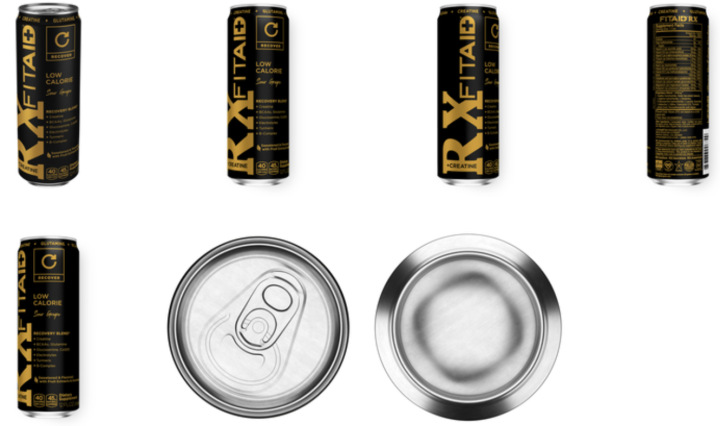 Conclusion:
Conclusion:
In conclusion, creatine supplementation can be beneficial for men of all ages who want to optimize their fitness and training. Contrary to popular belief, creatine is not just for bodybuilders and powerlifters. Creatine can help improve muscle strength and endurance, increase muscle mass, and reduce muscle damage and inflammation following exercise. Additionally, FITAID RX drinks can be an excellent post-workout recovery option for men looking to optimize their recovery time. By incorporating creatine and FITAID RX into their training and fitness routine, men can achieve their fitness goals and improve their overall health and well-being.
For many years, creatine supplementation has been associated with the fitness industry, particularly for bodybuilders and powerlifters. However, recent studies have shown that creatine can be beneficial for anyone who wants to improve their athletic performance, especially men. In this article, we will discuss the science behind creatine and recovery, debunk myths about creatine being just for “meat-heads,” and explain how creatine can help optimize fitness and training for men of all ages.
Want to know more about LIFEAID?
LIFEAID Beverage Company was founded in 2011 by friends-turned-business-partners, Orion Melehan and Aaron Hinde, who were passionate about fitness and health. We are based in Santa Cruz, California and produces a range of functional beverages designed to support active lifestyles and specific fitness needs.

LIFEAID products are different from their competition in a few key ways. First, we are formulated with natural and functional ingredients that are specifically chosen to support different aspects of fitness and recovery. The ingredients in LIFEAID products are backed by scientific research and are carefully selected to ensure that they are safe, effective, and of high quality. All of our hand-picked ingredients have met the highest supplement standards and remain vegan, non-gmo, and gluten-free.
Second, LIFEAID products are free from artificial sweeteners, and are made with non-GMO ingredients. This sets them apart from many other functional beverage brands that use artificial sweeteners, and additives in their products. Unlike other drinks marketed as "healthy alternatives" that are sweetened with artificial sweeteners like sucralose, aspartame, or Ace-K, LIFEAID products are ALWAYS naturally sweetened.
Third, LIFEAID products are designed to be convenient and easy to use. They come in a range of formats, including cans and powder packets, and are easy to take on-the-go. And they taste GREAT!
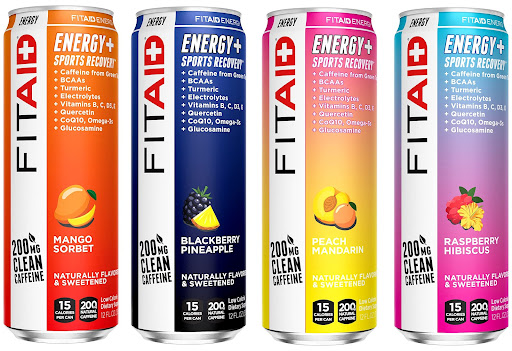
Here are five positive testimonials from customers who have used LIFEAID products:
- "I started drinking LIFEAID products after a tough workout, and I was amazed at how much they helped with my recovery. They taste great and I love that they are made with natural ingredients. I would definitely recommend them to anyone who is looking for a healthier way to recover after a workout!" - Sarah J.
- "As someone who is always on the go, I love how convenient and easy LIFEAID products are to use. The FITAID powder packets are perfect for when I'm traveling or don't have access to a fridge. They taste great and give me the energy and focus I need to power through my workouts." - Mark S.
- "I've tried a lot of different recovery drinks and FITAID products are by far my favorite. They taste great and they really help me to recover faster after a tough workout. I love that they are made with natural ingredients and don't have any of the junk that a lot of other drinks have." - Rachel K.
- "I've been using the IMMUNITYAID Powder Packs to boost my immune system and stay healthy during cold and flu season. They taste great and I feel like they really help to keep my immune system strong." - Tom H.
- "I'm always looking for ways to stay hydrated and focused during my workouts, and LIFEAID products have been a game changer for me. The FOCUSAID cans are perfect for when I need a little extra boost, and they taste great too!" - Katie B.
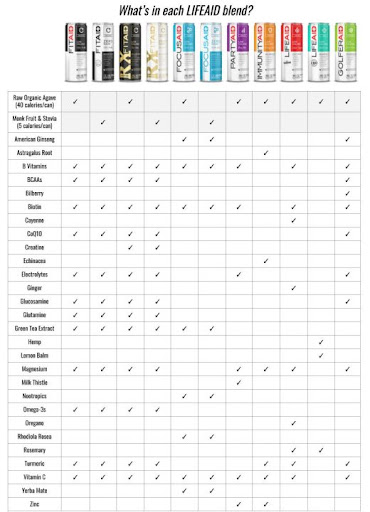
Their most popular drink is FITAID. It is a drink that is designed to help support recovery after exercise. It contains clean caffeine from green tea extract, which can help to enhance mental focus and alertness. Additionally, FITAID contains vitamins such as turmeric, glucosamine, vitamin B12, and BCAAs that can help to support muscle recovery. These ingredients are carefully selected for their potential health benefits and are included in FITAID in the form of clean, whole-food supplements.
LIFEAID Beverage Company was founded in 2011 by friends-turned-business-partners, Orion Melehan and Aaron Hinde, who were passionate about fitness and health. We are based in Santa Cruz, California and produces a range of functional beverages designed to support active lifestyles and specific fitness needs.
The Best Energy Drink Buyer's Guide for Clean Energy

The world seems to run on caffeine. Everywhere you look, coffee shops are popping up, and more and more energy drinks are stocking the shelves of convenience stores. They each have their unique selling point. Some are ultra-concentrated. Others are low in sugar. Some just flat-out look cool.
With all of the options, we know that it can be quite a challenge to find the best energy drink. You don’t have to run off and sample every beverage, though. We’ve created this buyer’s guide to energy drinks so that you can take the guesswork out of fueling your long day.
If you stick around until the end, we’re sure you’ll feel more confident the next time you buy an energy drink because we’ll cover everything you need to know about the product. We’re talking: the history of energy drinks (you’ll learn more than just a fun fact to pull out at your next party), the most popular brands, and if they even work. You’ll also find out more about some of the side effects that have sent consumers looking for a better alternative to the original energy drink.
Finally, by the end, you should be able to confidently pick up an energy drink, look at the label, and determine if it will be worth the purchase. We’ll even throw in our top suggestion for a clean energy drink to send you in the right direction. Keep reading to become the ultimate energy drink know-it-all.
A Quick Recap of Energy Drink History
Caffeine has been around long before anyone was writing anything down. Don’t worry—we’re not going to turn this into a snooze fest. After all, we already know you’re here looking for energy.
The First Energy Drink
We think it is worth noting, however, that relative to the history of caffeine, energy drinks are pretty new. The concept of the modern-day energy drink wasn’t around until the early 1960s. It was developed by Taisho, a pharmaceutical company in Japan, and the first drink was a product called Lipovitan D.
The company labeled it as an energizing tonic, and it was packaged in bottles very similar to the ones you might find in a hotel minibar! Originally, this tonic was produced to provide enough energy to truck drivers and factory workers so that they could stay awake while working long night shifts.
Unlike the energy drinks we have come to know and love, this product was treated more as a medicine. If you were to smell it, you would think it was cough syrup. However, it shares one very specific similarity to modern energy drinks, and that’s taurine. This is the leading ingredient in name-brand energy products, but these bottles contain far more servings.
Each mini bottle contains 3,000 mg of taurine. On the bottle, you’ll find a label that warns people not to consume more than 100 mg daily, which is how much you will find in a single Red Bull can.
Red Bull® Grows Its Wings
Since Lipovitan hit the shelves, more drinks started to become popular in Asian culture, and that’s where Red Bull® comes in. Dietrich Mateschitz was visiting Bangkok when he first had the chance to try one of the tonics, and he was so amazed by the effects that he partnered with another Japanese manufacturer to bring the drink to the global market under the name Red Bull®. This didn’t happen until 1984, and it was initially only available in Europe. It took more than a decade to finally make it to the United States.
By 1997, Red Bull® was finally on the shelves in the US, and it took off. People were crazy about the drink's effects caused by the perfect combination of carbonation, taurine, and caffeine. Not only did it give them more energy, but it also increased focus. Since it had such success all over the world, it’s no surprise that other brands wanted to get in on the action. Today, you have countless options in the energy drink marketplace.
What Are the Most Popular Energy Drinks?
As one of the first energy drinks, it’s no surprise that Red Bull® remains one of the consumers' most popular options. Not only do they have a well-known product, but they also do an exceptional job of marketing their drinks with events like Red Bull® Magnitude surfing contests and Supercup Races.
Other energy drinks have taken note of Red Bull®’s success, and many have tried to follow in their footsteps. A few have been successful. Today, there are a handful of energy drinks that have become household names. You might have heard of:
- Monster Energy®
- Rockstar Energy®
- Full Throttle Energy®
- 5-Hour Energy®
- NOS Energy®
So Do They Really Work?
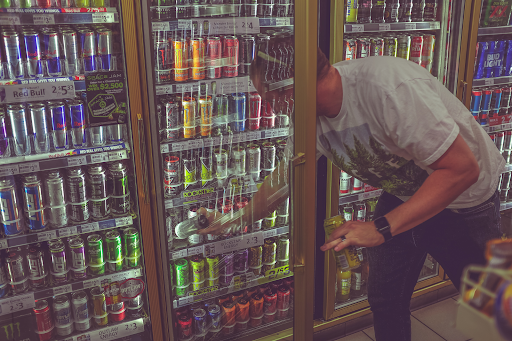
These drinks didn’t become such a sensation just because they tasted good. People truly drink them for the effect they give, so the answer is yes! They really do work.
Several studies have shown the effectiveness of energy drinks, and they concluded that the beverages do improve physical endurance. That means they can provide you with the energy you need to power through a run or just a long day of work. It’s important to note that far less evidence shows a connection between energy drinks and improved muscle strength or power.
The reason that most energy drinks work is that they contain both caffeine and taurine. Caffeine is a stimulant, so it helps to keep you alert and awake. Taurine is another effective ingredient because research suggests it can support mitochondria, which is the cell's powerhouse. Many energy drink brands also include vitamin B12 and ginseng.
Both of these ingredients are found to provide an overall increase in energy levels. When you combine all of these, you get a product that keeps you alert and focused even when you have to work overtime.
Common Side Effects of Energy Drinks
Unfortunately, energy drinks with too much caffeine don’t come without their risks. Remember that warning label on the tiny Lipovitan D bottle? People must use caution when consuming energy drinks. Too much taurine can make you sick. You might experience the following:
- Vomiting
- Nausea
- Headaches
- Stomach Pains
- Liver Pain
Taurine isn’t the only concern.
Energy drinks can have other adverse side effects due to the combination of sugar and other energy-boosting ingredients. Some people are more sensitive than others, so it’s important to use caution and limit your intake of these highly caffeinated beverages.
For example, these drinks may cause an increase in heart rate as well as blood pressure. Some consumers also report getting the jitters, which can be displayed in shaking hands. For other people, energy drinks cause problems with sleep and anxiety.
There Has to Be Something Better, Right?
If you don’t want to consume energy drinks that can harm your health, we don’t blame you! We think it’s important for people to know all the effects and options available so that they can find the right choice for their well-being.
Fortunately, plenty of companies have started to create healthy energy drink alternatives to some of the leading energy drink brands. These products provide people with clean energy and leave out all of the stuff that makes you feel bad.
If you want to start shopping for effective and healthy energy drinks, we recommend that you learn more about what ingredients provide clean energy. Keep reading to learn more about what you should look for on the nutrition facts labels.
What Should You Look for in the Best Energy Drink?

As you start to skim the label on your energy drink, you’ll want to look out for many ingredients. We recommend that you specifically look for three things when you are trying to narrow down which drink gives you the most energy without the negative side effects.
1. No Added Sugar
There are several reasons that a person may want to avoid sugar in their energy drink. Whether you’re diabetic or on a diet, having too much sugar in an energy drink can make you feel sick. Some of the drinks are packed full of artificial sweeteners to improve taste, but these sugars can lead to nausea and vomiting.
That’s not all!
We recommend that consumers stay away from drinks that are packed full of simple carbohydrates. These sugars are what cause the infamous sugar rush and the ultimate crash. Though the sugar might give your energy drink a bigger boost, it won’t last long. In a few hours, you’ll feel tired again, and there’s a chance you’ll feel worse than before you drank the beverage.
2. Clean Caffeine Sources
Rather than looking for which energy drink has more caffeine, you should see where it comes from. There are several sources of caffeine, but not all are created equal. Some are healthier for you than others, and those are typically referred to as clean caffeine sources.
What are some examples of clean caffeine?
We recommend that you look for labels that have tea in them. Tea provides the body with a much more sustainable boost in energy so you can avoid the dramatic effects. Green tea, in particular, is a great source of clean energy. However, yerba mate is another great option. This is a type of herbal tea that has been shown to decrease tiredness and fatigue. These ingredients also contain several vitamins.
3. Healthy Nootropics
While caffeine is perfect for providing you with more energy, you should look for ingredients that also help to increase your focus and attention. Fortunately, many energy drinks include nootropics, which is a substance that claims to improve a person’s cognitive function. They especially boost mood, attention, memory, and motivation.
Taurine is a great example of a nootropic, so it’s no wonder it’s often included in energy drinks. Alpha-glycerophosphocholine (Alpha-GPC) is an ingredient that can boost brain function in the areas of learning and memory. GABA is another nootropic that can relieve stress in addition to only improving focus and mental clarity.
What Other Ingredients Are in the Most Effective Energy Drink?
If you are looking for the most effective energy drink, it should be a product that provides you with well-rounded benefits. Some beverages are designed to give you more hydration. Others can aid you in the sports recovery process.
While there is no shortage of energy drink formulas to achieve different goals, we recommend that you look for a product that has at least a few of the following ingredients:
Ginseng
- If you want another clean ingredient to help increase energy and reduce fatigue, American Ginseng should be on your radar. The additive has also been linked to anti-inflammatory and antioxidant properties. It may even enhance brain function and strengthen your immune system.
B Complex Vitamins
- Many people don’t get enough vitamins B1, B2, B3, B5, B6, B7, B9, or B12. Fortunately, many of the best energy drinks include a B complex vitamin to cover all of these bases. This provides more energy and offers several other benefits, including improved nerve function, eyesight, and growth of red blood cells.
Vitamin C
- Did you know that an energy drink can also support your immune system? Some of the most effective energy drinks include vitamin C as well. This antioxidant can help with immunity, and it’s important for healing.
Electrolytes
- Finally, you don’t want to be left feeling dehydrated. Some energy products also offer electrolytes. These electrically-charged ions are key to making sure your body gets the most out of every drop of fluid you consume. You’ll see these ingredients listed as minerals, such as sodium, magnesium, chloride, calcium, and potassium.
These are just a few suggestions to guide you as you start shopping for the best energy drinks. Of course, you should consult a doctor or nutritionist if you have special dietary needs. Since Red Bull was first introduced to the United States, the market has exploded, so we’re sure that you will be able to find an effective beverage that meets all of your health and wellness needs.
The Most Energizing Energy Drink
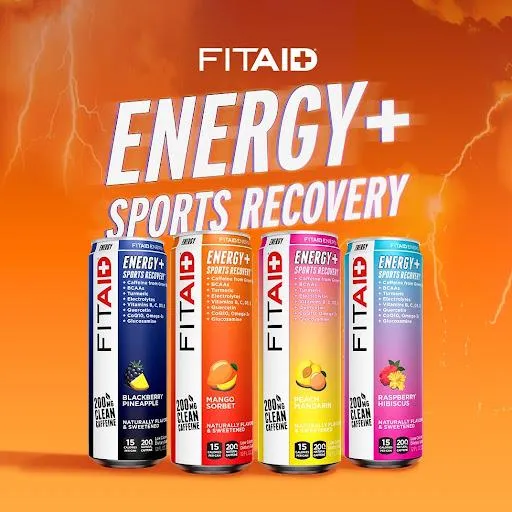
At LIFEAID, we offer a variety of beverages, but our FITAID Energy product is by far the most energizing energy drink. Each serving of FITAID Energy provides you with 200 mg of clean energy. That’s right—we don’t use any fake stuff in our products. All of the caffeine from this drink is sourced from green tea extract so that you can get a gradual and more sustainable increase in energy.
In addition to reducing fatigue, our FITAID Energy drink also aids athletes in sports recovery. This means it is the ultimate beverage to consume after a tough workout. Additives like glucosamine may support joint health and reduce post-workout inflammation. The BCAAs also may be the key to preventing your muscles from breaking down after intense resistance exercise.
Those aren’t the only clean ingredients you can expect. FITAID Energy is also packed full of:
- Electrolytes
- Turmeric
- Quercetin
- CoQ10
- Vitamins
Want to know the best part about this drink?
It’s perfect for nearly everyone. The drink is vegan, gluten-free, sodium-free, paleo-friendly, Kosher, and non-GMO. Therefore, it fits into a lot of restricted diets. It’s also a low-calorie energy drink at only 15 calories with 3 g of sugar, and there are no artificial sweeteners.
Instead, FITAID comes in four delicious and clean flavors, such as:
Therefore, we are confident that you will find a drink that you love.
Most Effective Energy Drink to Improve Focus
If you don’t need assistance with sports recovery, you may be more interested in a drink that improves both energy and focus. At LIFEAID, we offer a product designed to deliver clean energy and a brain boost by combining nootropics with vitamins and a clean caffeine source.
Unlike the highly caffeinated FITAID Energy, FOCUSAID offers just 100 g of caffeine that comes from a mix of green tea extract and Yerba Mate leaves. This drink comes with only 40 calories per can and 7 g of sugar, so you can rest assured that none of the energy is coming from artificial sweeteners.
What ingredients do we add to improve focus?
Our goal is to only use clean herbs, vitamins, and nutrients to support brain health, so our drinks include additives like:
Acetyl-L-Carnitine
- This particular ingredient might be a great source of neurotransmitter support, and it nurtures brain health so that you can have better focus, learning, and memory.
B Complex Vitamins
- Not only do they provide you with endurance, but they also improve your nervous system function.
GABA
- We include this additive because it is a neurochemical that is naturally present in the brain. Its role is to help improve mental clarity. It also assists with stress relief and focus.
Alpha-GPC
- By adding this clean choline compound into the mix, we can optimize brain function and give you a boost in memory and learning. It may also be key in supporting nerve health.
If you are looking for a zero-sugar alternative to FOCUSAID, we have you covered! You can choose from either FOCUSAID Zero or our FOCUSAID Go packet. This convenient powder is perfect for on-the-go hydration as well. You can simply mix it into your favorite bottle of water. Either way, you’ll still get 100 mg of clean energy.
Learn More About How to Find the Best Energy Drink for You
We know that we just gave you a lot of information to absorb. By now, you’re an expert on the history of energy drinks. Okay, maybe not quite an expert, but now you should know more about these beverages than you did before! Most importantly, you know about the different ingredients that you should look for and avoid.
Are you finally ready to start shopping for long-lasting energy drinks that use clean ingredients? If so, you don’t have to go far. LIFEAID makes it easy to power through your day with FITAID Energy or FOCUSAID.
You can easily shop for all of our products directly from our website. Free shipping is available with any monthly subscription. You can also save 10% on every purchase when you enroll.

If you would rather sample our energy drinks before you commit, you can make a one-time purchase for a 12-pack in any flavor. We also now offer a FITAID Energy variety pack, so you can try all four flavors to see which one is your favorite. We strongly encourage you to try any of our other products if you are looking for hydrating beverages that meet your other needs.
We know that there are still some people who prefer to do their shopping in person. If that’s you, you’ll be happy to know that we also sell our products in a variety of retail locations across the country. You can use our convenient store locator to find a location closest to you.
The tool will even show you which product each store carries, so you don’t have to go on a wild goose chase. With all the ways we make it easy to access clean energy drinks, what’s stopping you from trying FITAID Energy today?
With all of the options, we know that it can be quite a challenge to find the best energy drink. You don’t have to run off and sample every beverage, though. We’ve created this buyer’s guide to energy drinks so that you can take the guesswork out of fueling your long day.
What Energy Drink Works The Best?
Life is full of work, social outings, and responsibilities that leave you feeling tired. Often, there doesn’t seem to be enough time in a day to get everything done, let alone to get enough sleep at night. As a result, many adults go through their day powered by caffeine. Some choose to drink cup after cup of coffee, while others seek out highly-caffeinated energy drinks.
Due to the increase in popularity over the last few decades, the energy drink industry has seen a lot of changes. Today, there are a variety of products available so it can be difficult to know what energy drink works the best. Each has its own unique benefits. For example, some brands are known for long-lasting energy drinks, while others are designed to give you a quick burst when you need it most.
In this guide, we’re specifically going to look at the most energizing energy drink. We’ll cover the basic definition of an energy drink and how it works so that you can understand more about what makes one product more effective than another. We’ll also go over some of the key ingredients that you should look for when trying to choose a drink that delivers the most energy.
You’ll even learn more about some of the most popular energy drinks and the side effects that come with them. Finally, we’ll point you in the direction of clean energy drinks that work to keep you energized without all of the junk.
What Is an Energy Drink?
The National Center for Complementary and Integrative Health (NCCIH) defines an energy drink as a product that increases energy while also enhancing a person’s physical performance and mental alertness. These products primarily come in two forms.
You can purchase a standard energy drink in cans similar to that of a soft drink. They typically come in 16-ounce servings, but you can also purchase them in larger options. Some brands also offer “energy shots.” These are concentrated caffeine drinks that are typically sold in containers that hold 2 ounces of liquid. These are designed to give you the same amount of energy as their larger counterparts.
How Much Caffeine Is in an Energy Drink?
Though some energy drinks offer lower caffeine levels, the average drink contains 70-240 mg of caffeine. In the concentrated energy shots, you’re more likely to see products in the range of 113-200 mg. To put that into perspective, a typically 8-ounce cup of coffee contains about 100 mg of caffeine.
That means that the 2-ounce energy shots can give you twice that caffeine with just 25% of the liquid. It’s no surprise that more and more people are turning to these products as their preferred caffeine source.
How Do Energy Drinks Work?
Many people know that an energy drink helps them power through a long day, but few people know the science behind these products. To know what energy drink gives the most energy, you must understand how they work.
Energy drinks are made up of a combination of different ingredients, but caffeine is one of the most important ones. The reason is that caffeine is responsible for inhibiting the effects of adenosine. That is the brain chemical that tells your body when to sleep.
When it is blocked, it causes an increase in neuron activity that tricks your body into thinking there is an emergency. Your body then goes into “fight or flight” mode and releases adrenaline to increase your heart rate and release more sugar into your bloodstream.
That’s not all!
Caffeine also stimulates the part of your body responsible for producing dopamine. This chemical activates your body’s pleasure center and leaves you feeling better. When you combine all of these effects, you physically feel more energized and less exhausted.
Many energy drinks that work most effectively have other legal stimulants as well. These ingredients work with caffeine to increase alertness and attention. Popular stimulant additives have even been shown to increase heart rate, breathing, and blood pressure.
What Ingredients Are Found in Strong Energy Drinks?
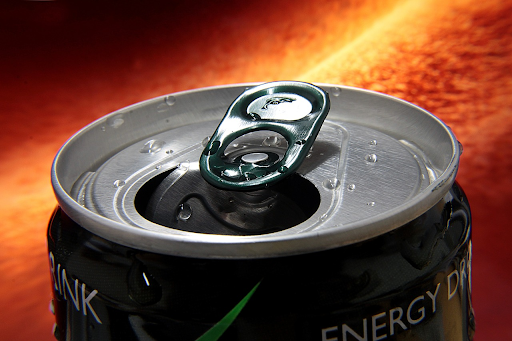
Though the exact ingredients used can vary from one brand of energy drink to the next, there are several that are widely used. If you want to know which energy drink gives you the most energy, you will want to look for a product that uses a combination of different stimulants with caffeine.
The following are just a few of the most popular additives that you will notice in strong energy drinks:
Taurine
This non-proteinogenic amino sulfonic acid is one of the original ingredients in energy drinks. It was used in Liptovan in Japan back in the 60s and was marketed as a product to increase energy, but it acts as a nervous system depressant rather than a stimulant.
Ginseng
Long before ginseng was ever found in a can of energy drink, it was used by Native Americans as a stimulant. The root was used to treat an array of ailments, from indigestion and headaches to fever and infertility.
It remains a popular herb because it is healthier and less addictive than other sources of energy. It also has been associated with cognitive improvements for memory and immune system support.
B Complex Vitamins
Though it is not a stimulant, vitamin B12 is one of the most energizing of the eight B-complex vitamins. Increasing your intake when your body is low on this nutrient has been shown to help people feel more energized and alert.
Since most people don’t produce enough of this on their own, it must be supplemented by outside sources, such as food, energy drinks, and multivitamins.
L-Carnitine
This ingredient is another example of an amino acid derivative that plays a major role in your body’s energy production. L-Carnitine is responsible for transporting fatty acids to the mitochondria.
While your body can make this ingredient, supplementing it with an energy drink helps to increase your overall energy production.
Guarana
Amazonian tribes have been using this native plant for centuries due to its therapeutic benefits, but it has also become a popular ingredient in some of your favorite energy drinks. In fact, 70% of the world’s guarana plants are used in the beverage industry.
This is because the plant contains several different stimulants, including caffeine, theobromine, and theophylline.
Sugar
The energy drinks that provide the most energy almost always include sugar because simple carbohydrates can provide a quick boost of energy. The body can break them down and send the sugar into your bloodstream faster than complex carbohydrates.
As a result, you get that well-known sugar rush followed by the infamous crash.
Inositol
Finally, several of the most common energy drinks add inositol because it helps the body modulate serotonin, which is the hormone that makes you feel happier, more focused, and calmer. It helps fend off feelings of anxiety and depression.
Which Energy Drink Gives You the Most Energy?
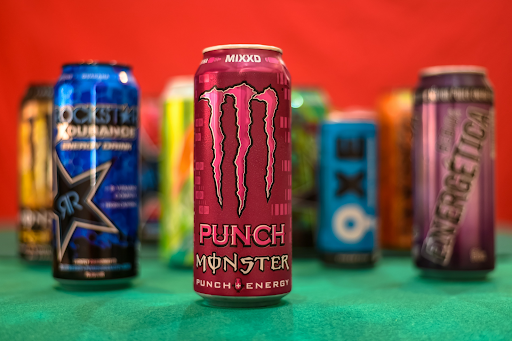
Did you know that energy drinks are one of the most popular dietary supplements among young adults and teens? They are only bested by multivitamins! Since they sell so well, it should come as no surprise that several brands are trying to get in on the market.
Some have been successful in their efforts to create ultra-powerful energy drinks, but what energy drink is the strongest? The following are some of the most energizing beverages available:
Spike®
There’s no doubt about it. Spike Hardcore Energy® belongs at the top of the list as one of the strongest energy drinks available. You won’t find another like it on the market. The can is only 16 ounces, but it has a whopping 350 mg of caffeine. That’s the equivalent of drinking 3.5 cups of coffee.
Unlike most popular energy drinks, this product doesn’t contain any sugar or carbohydrates. Instead, you’ll find the following ingredients:
- Caffeine
- Beta-Alanine
- Acetyl-L-Tyrosine
- Vitamin B12
Redline®
Though Redline Xtreme® doesn’t offer quite as much caffeine, it is more concentrated. In just one 8-ounce bottle, you’ll get an impressive 316 mg of caffeine. Don’t let the smaller bottle fool you, though. It is easy to overdose on caffeine, so you shouldn’t attempt to drink more than one serving.
Much like Spike®, this is an energy drink you will want to consume with caution. Since it contains more caffeine than three cups of coffee, it can create a quick burst of energy that many people aren’t used to. If you are sensitive to caffeine or new to energy drinks, you could experience negative side effects.
If you need the extra energizing power that comes with this beverage, you will be happy to know that it is zero-sugar, as well. It even includes electrolytes, so it is a perfect pre-workout energy drink option.
Bang®
A Bang Energy® drink is another great option for someone looking to hit the 300 mg mark in their caffeine intake. It also packs a lot of caffeine per ounce of liquid, so it’s another concentrated solution designed to provide quick energy.
The product is perfect for people who need extra energy to get through a tough workout, and since it has zero sugar or carbohydrates, this is a great choice for people trying to lose weight.
What else does it have?
It’s more than just your average energy drink. It also contains EAAs, CoQ10, and Super Creatine by Bang®. Together, these products work to provide athletes with all of the ingredients they need to crush their next workout.
Reign®
Reign Total Body Fuel® also falls under the athletic energy drink category. The creator of this product formulated it with athletes in mind, so it can help you push your body as far as it can go. The 16-ounce can contains 300 mg of caffeine, so while it’s powerful, it’s not quite as concentrated as some of the other options.
Athletes especially love that this zero-sugar drink contains 1000 mg of BCAAs, which are amino acids that support muscle health. Each can also have CoQ10, B vitamins, and electrolytes.
That’s not all!
This fruity-flavored beverage gets its 300 mg of caffeine from a blend of coffee beans and tea leaves.
Celsius®
We round off our list of the most energizing energy drinks with another fitness-related beverage. Celsius Energy® is advertised as a product to help speed up your metabolism to help burn body fat. Though most of Celsius Energy®’s basic varieties only contain 200 mg of caffeine, they offer a Celsius Heat® version that has 300 mg of caffeine in just a 10-ounce can.
What ingredients make up this allegedly thermogenic energy drink?
In each can of Celsius Heat®, you’ll find a healthy dose of caffeine, taurine, guarana extract, and ginger extract. Similar to most of the other strong energy drinks on this list, Celsius Heat® doesn’t have any sugar, and it is low in carbohydrates.
Negative Side Effects of Drinking These Stronger Energy Drinks
Choosing the best energy drinks isn’t just about finding one that has the most caffeine. For most adults, it is safe to consume up to 400 mg of caffeine each day. However, that doesn’t mean that you won’t experience any side effects when you drink these ultra-strong energy drinks. Many people cannot drink more than 200 mg of caffeine in one serving without any problems, so consuming highly-caffeinated drinks already puts you at risk of feeling sick.
Aside from being high in caffeine, there are several ingredients in those products that can leave you feeling unwell. Consuming too many stimulants and an excessive amount of caffeine can lead you to experience:
- Nausea
- Headaches
- Stomach Pains
- Liver Pain
- Dehydration
- Anxiety
- Insomnia
- Sugar Crash/Fatigue
- Jitters
For many people, these symptoms occur when they consume products that are high in sugar, and other additives. Fortunately, many clean energy alternatives prove to be the best because they deliver all of the benefits without the junk.
Keep reading to learn more about some clean energy drinks that can help you power through a night of studying, workout, or just your usual tiredness.
The Strongest Energy Drink With Clean Caffeine
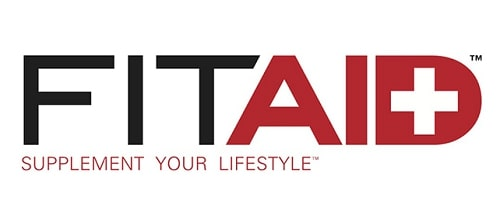
FITAID Energy is the highest caffeinated beverage by LIFEAID. With 200 mg of clean caffeine in each 12-ounce can, you get the perfect amount of energy per serving. Since it doesn’t have more than 300 mg per can, you are less likely to experience the negative side effects of consuming energy drinks with too much caffeine.
Instead, you can get just the boost you were looking for without the jitters or sick feelings that you may experience with other brands.
What makes the caffeine from these healthy energy drinks different from what is found in other energy drinks?
LIFEAID only uses clean ingredients, so we make sure that our caffeine comes from clean sources, too. The 200 mg of caffeine in this product comes from green tea leaves.
That’s not even the best part. Much like many of the strong energy drinks we discussed before, this product is ideal for helping athletes energize their bodies for better performance, and it contains several ingredients that make it an overall great drink to supplement your diet. Each serving of FITAID contains BCAAs, B-Complex vitamins, CoQ10, and electrolytes like the powerful energy drinks listed above.
However, this product goes beyond just providing you with an excessive amount of caffeine. They also include:
- Turmeric which may reduce inflammation from everyday stress.
- Glucosamine to support joint health and prevent post-workout soreness.
Best Energy Drink for Post-Workout Recovery
At LIFEAID, we don’t just offer energy drinks for people looking to get the most energy. We also offer dual-purpose products, including energy drinks that aid in sports recovery. FITAID RX is a product that specifically offers bonded creatine supplements. The biggest difference between this product and traditional FITAID is that it has 1,000 mg of added creatine, perfect for your intense exercise.
This particular ingredient makes this drink an excellent choice for people who are looking to develop and maintain both speed and power while they are working out. Creatine can also reduce the amount of muscle and protein breakdown that occurs. Along with creatine, you’ll also find caffeine sourced from green tea extract.
Each serving contains about 45 mg of caffeine which makes it far less energizing, but many people love the recovery blend because it also has:
- A B-Complex Vitamin to promote energy and endurance while also maintaining muscle tone.
- BCAAs & glutamine to reduce muscle breakdown during long periods of intense exercise.
- Glucosamine & quercetin that may help prevent inflammation that causes post-exercise soreness.
Want to know the best part? This low-calorie energy drink also comes in a zero-sugar option, so it is perfect for many diet and exercise plans.
Which Energy Drink Works the Best for Studying?
Finally, we offer an energy drink that also provides consumers with a brain boost. That’s right—our FOCUSAID is the perfect blend of nootropics and caffeine to make sure that you are awake, alert, and focused on any task. As a result, it’s the best energizing drink for students.
Though it might not be the strongest energy drink on the list, it does offer 100 mg of clean caffeine. The caffeine is sourced from Yerba Maté and Green Tea, so it doesn’t give you the spike and crash that you get with some of the other products.
Instead, this is a long-lasting energy drink that provides you with the nourishment you need to focus on any task—even if you have to stay up all night cramming for a test.
What makes this energy drink so effective?
The combination of caffeine and nootropics like American Ginseng and Acetyl-L-Carnitine. It also contains a B-complex vitamin, but that isn’t all.
We go above and beyond with our blend of herbs, vitamins, and nutrients, so you can also expect:
- GABA
- Alpha-GPC
- Vitamin C
- Vitamin D3
- Biotin
- Niacin
- Riboflavin
All of these ingredients work together to improve your brain's memory and function while also improving alertness and overall energy. To top it off, this product comes in two flavors, a zero-sugar alternative, and a convenient powder packet.
Discover What Energy Drink Gives You the Most Energy

Did you come here looking to find what drink gives you the most energy? If so, we hope that you found this guide helpful. You should now know a little bit more about what to look for when shopping for an energy drink.
If you are interested in trying any of our different energy drink products, we recommend that you look through all of the flavors and product lines that we have to offer. We’re sure that you’ll be able to find an energy drink that you love. If you still aren’t sure where to start, you can try out the variety pack of our FITAID Energy drinks. It comes with all four of our flavors in one 12-pack.
At LIFEAID, we strive to make buying energy drinks as easy as possible, so you can order our variety pack or any other flavors directly from our website. When you order online, you can make a one-time purchase or sign up for our subscription to save 10% off all your future monthly orders. You’ll also get free shipping with your subscription and never have to worry about running out of your favorite energy drink. Convenience and savings? You can’t beat that!
Finally, you can also purchase our products from your favorite retailer. Our drinks are available in several local grocery and convenience stores around the country. You can use our store locator to see what products are near you. With all of these ways to shop and save, it’s never been easier to stay energized. What’s stopping you from finding the best energy drinks to help you power through your day?
Did you come here looking to find what drink gives you the most energy? If so, we hope that you found this guide helpful. You should now know a little bit more about what to look for when shopping for an energy drink.
Creatine Supplements for Women
So, I heard women should not take creatine.
We call bullshit.
Creatine IS for women. Period.
 (Breanna Cope, WSL Professional Surfer - with FITAID RX)
(Breanna Cope, WSL Professional Surfer - with FITAID RX)
Creatine is a popular supplement among athletes and fitness enthusiasts. It is believed to improve strength, power, and muscle mass. However, there are many myths surrounding creatine supplementation, particularly for women. This blog post aims to debunk these myths and provide an in-depth analysis of creatine and its benefits for post-workout recovery in women. We will also discuss the science behind creatine and recovery, whether creatine supplementation is only for men, what creatine is, and how it works. We will also cover the role of FITAID drinks in post-workout recovery and how they aid muscle recovery.
What is Creatine?
Creatine is a naturally occurring compound found in our bodies, primarily in our muscles. It is produced in our liver, pancreas, and kidneys and is used to supply energy to our muscles during high-intensity activities. Creatine can also be obtained from the diet, particularly from animal sources like beef, pork, and fish.
Creatine Supplementation and Women: Debunking Myths
One of the most common myths about creatine supplementation is that it is only for men. This is not true. While it is true that men have higher creatine levels than women, there is no scientific evidence to suggest that creatine supplementation is harmful to women. In fact, several studies have shown that creatine supplementation can be just as effective in women as it is in men.
Another myth is that creatine supplementation can cause weight gain and bloating. While it is true that creatine can cause the body to retain water, this is not the same as gaining fat. In fact, several studies have shown that creatine supplementation can actually improve body composition by increasing lean muscle mass and reducing body fat.
(Hunter Elam, USA Weightlifting Olympian, with FITAID RX ZERO)
The Science Behind Creatine and Recovery
Creatine supplementation has been shown to improve post-workout recovery by enhancing muscle repair and reducing inflammation. When we exercise, our muscles undergo stress and damage, which can cause inflammation and muscle soreness. A creatine recovery drink helps to reduce inflammation and promote muscle repair by providing energy to the muscles and enhancing the production of adenosine triphosphate (ATP), which is the primary source of energy for our cells.
Is Creatine Supplementation Only for Men?
As mentioned earlier, creatine supplementation is not only for men. Several studies have shown that women can benefit from creatine supplementation just as much as men. In fact, one study showed that women who took creatine for 10 weeks saw an increase in lean muscle mass and a decrease in body fat, without any negative side effects.
Does Creatine Really Work?
Yes, creatine supplementation has been shown to be effective in improving strength, power, and muscle mass. Several studies have shown that creatine supplementation can increase muscle strength and power by up to 20%, particularly during high-intensity activities like weightlifting and sprinting.
Creatine and Post-Workout Recovery for Women
Creatine can play a key role in post-workout recovery for women. As mentioned earlier, creatine helps to reduce inflammation and promote muscle repair, which can help to reduce muscle soreness and improve recovery time. Additionally, creatine supplementation can improve energy levels and cognitive function, which can help to enhance overall performance during workouts.
Getting More Creatine in Your Diet
While creatine can be obtained from animal sources like beef, pork, and fish, it can be difficult to get enough creatine from the diet alone. This is why many athletes and fitness enthusiasts choose to supplement with creatine. The recommended dose of creatine is 3-5 grams per day, which can be taken in a single dose or split into multiple doses throughout the day.
FITAID Drinks and Post-Workout Recovery
FITAID RX, which is a product that is specifically designed for athletes and contains 1000mg of bonded creatine. FITAID RX is formulated to aid in muscle recovery, reduce inflammation from everyday stress, and promote endurance, and contains 1000mg of creatine per serving. FITAID drinks are a great option for post-workout recovery, particularly for women, as they contain a variety of ingredients that can aid in muscle recovery. FITAID drinks contain no artificial sweeteners, sucralose, aspartame, or Ace-K, which can be harmful to the body in high doses.
FITAID RX comes in two options of sweeteners; Raw Agave or No Sugar - happily sweetened with Monk Fruit. FITAID RX also contain clean caffeine from green tea extract, which can help to improve energy levels and cognitive function. This can be particularly beneficial for women who may feel fatigued after a workout.
The vitamins in FITAID RX drinks, such as turmeric, glucosamine, vitamin B12, and BCAAs, can also help to aid in muscle recovery. Turmeric is a natural anti-inflammatory, which may help to reduce inflammation from everyday stress and muscle soreness. Glucosamine is a key component of joint cartilage and may help to reduce joint pain and inflammation from everyday stress. Vitamin B12 is important for energy metabolism, while BCAAs (branched-chain amino acids) are essential amino acids that can help to promote muscle repair and recovery.
Scientific References
Several scientific studies have been conducted on the benefits of creatine supplementation for post-workout recovery in women. One study published in the Journal of the International Society of Sports Nutrition found that creatine supplementation improved muscle strength and power in women and had no negative side effects.
Another study published in the Journal of Strength and Conditioning Research found that creatine supplementation improved muscle endurance and reduced muscle soreness in women after high-intensity exercise.
(Kelsey Keil, Elite CrossFitter and Weightlifter with FITAID RX ZERO)
Conclusion
In conclusion, creatine supplementation can be an effective way to improve post-workout recovery in women. It can help to reduce inflammation, promote muscle repair, and improve energy levels and cognitive function. While there are many myths surrounding creatine supplementation, particularly for women, there is no scientific evidence to suggest that it is harmful or ineffective for women. FITAID drinks are a great option for post-workout recovery, as they contain natural ingredients that can aid in muscle recovery without any harmful artificial sweeteners.
Here are a few links to scientific research on creatine supplementation and women:
- "Effects of Creatine Supplementation on Women's Lower-Body Strength: A Randomized Controlled Trial": This study published in the Journal of Strength and Conditioning Research found that creatine supplementation improved lower body strength in women and had no negative side effects.
- "Effect of Creatine Supplementation on Muscle Strength and Endurance in Female Soccer Players": This study published in the Journal of Sports Science and Medicine found that creatine supplementation improved muscle strength and endurance in female soccer players.
Link: https://www.ncbi.nlm.nih.gov/pmc/articles/PMC4105388/
- "Creatine Supplementation Improves Muscle Strength and Power Output in Women After Resistance Training": This study published in the Journal of Strength and Conditioning Research found that creatine supplementation improved muscle strength and power in women and had no negative side effects.
- "Effects of creatine supplementation on body composition, strength, and sprint performance": This study published in Medicine and Science in Sports and Exercise found that creatine supplementation improved body composition, strength, and sprint performance in women.
Link: https://pubmed.ncbi.nlm.nih.gov/12900686/
These studies provide evidence that creatine supplementation can be beneficial for women in terms of improving muscle strength, endurance, and performance. However, as with any supplement, it's important to consult with a healthcare professional before adding creatine to your routine.
Creatine supplementation can be an effective way to improve post-workout recovery in women. It can help to reduce inflammation, promote muscle repair, and improve energy levels and cognitive function. While there are many myths surrounding creatine supplementation, particularly for women, there is no scientific evidence to suggest that it is harmful or ineffective for women. FITAID drinks are a great option for post-workout recovery, as they contain natural ingredients that can aid in muscle recovery without any harmful artificial sweeteners.
Looking for some Sunday Recovery reading with your ice-cold FITAID? Try...
Book Review of Eat the Yolk
Or just read this review below to impress your friends.
"Eat the Yolks" by Liz Wolfe is a book that challenges many of the commonly-held beliefs about nutrition and offers a more holistic approach to healthy eating. The book is full of practical advice and is written in a humorous and approachable style that makes it easy to read and understand.
Wolfe begins by discussing the history of nutrition and how we've been led astray by various dietary fads and myths. She then delves into the science behind nutrition and explains the benefits of eating a diet that is rich in nutrient-dense, whole foods.
Throughout the book, Wolfe tackles a wide range of topics, from the importance of healthy fats and the dangers of sugar to the benefits of consuming bone broth and fermented foods. She also provides practical advice on how to make healthy choices at the grocery store and in restaurants.
Ultimately, "Eat the Yolks" offers a refreshing perspective on nutrition and encourages readers to embrace a more natural and nourishing approach to eating.
Similar books to "Eat the Yolk"
If you enjoyed "Eat the Yolks" and are interested in similar books, you may want to check out:
-
- "Real Food" by Nina Planck - This book provides a comprehensive guide to eating whole, natural foods and explains the benefits of consuming traditional foods.
- "Deep Nutrition" by Catherine Shanahan - This book explores the connection between nutrition and health, with a focus on the benefits of eating a diet that is rich in healthy fats, nutrient-dense foods, and fermented foods.
- "The Primal Blueprint" by Mark Sisson - This book offers a holistic approach to health and fitness, with a focus on consuming whole, natural foods and engaging in physical activity that mimics our ancestral lifestyle.
- "In Defense of Food" by Michael Pollan - This book provides a thought-provoking analysis of the Western diet and the science behind what we eat, with a focus on the benefits of consuming whole, natural foods.
“Eat the Yolks” by Liz Wolfe is a book that challenges many of the commonly-held beliefs about nutrition and offers a more holistic approach to healthy eating.
Looking for some Sunday Recovery reading with your ice-cold FITAID? Try...
Book Review of Sacred Cow
Or just read this review below to impress your friends.
"Sacred Cow" by Diana Rodgers RD is a thought-provoking book that challenges popular misconceptions about meat and its impact on the environment. The book argues that meat can be produced in a way that is not only sustainable but also supports a healthy and diverse ecosystem.
The book begins by exploring the history of meat production and how modern agricultural practices have led to environmental degradation and health problems. Rodgers then delves into the science of meat production and argues that grazing animals can play a critical role in restoring soil health and sequestering carbon.
Rodgers also addresses the ethical considerations of meat production and consumption, arguing that it is possible to produce and consume meat in a way that is humane and supports animal welfare.
In addition to making a compelling case for the benefits of sustainable meat production, "Sacred Cow" provides practical advice for incorporating meat into a healthy and sustainable diet, with recipes and meal plans to help readers get started.
Similar books to "Sacred Cow"
If you enjoyed "Sacred Cow" and are interested in similar books, you may want to check out:
-
- "The Omnivore's Dilemma" by Michael Pollan - This book explores the complex issues surrounding food production and consumption, with a focus on the ethical, environmental, and health considerations of eating.
- "The Big Fat Surprise" by Nina Teicholz - This book challenges the conventional wisdom around fat and cholesterol, arguing that a diet high in saturated fat can be healthy and beneficial.
- "Nourishing Traditions" by Sally Fallon - This book provides a comprehensive guide to traditional food preparation methods and the benefits of consuming nutrient-dense, whole foods.
- "The Carnivore Code" by Paul Saladino - This book makes a case for a carnivorous diet as a means of optimizing health and longevity, with a focus on sourcing and preparing high-quality animal products.
“Sacred Cow” by Diana Rodgers RD is a thought-provoking book that challenges popular misconceptions about meat and its impact on the environment. The book argues that meat can be produced in a way that is not only sustainable but also supports a healthy and diverse ecosystem.
Looking for some Sunday Recovery reading with your ice-cold FITAID? Try...
Book Review of Breath
Or just read this review below to impress your friends.
"Breath" by James Nestor is a fascinating exploration of the power of breath and how it impacts our health and well-being. The book delves into the science behind breathing and offers practical techniques for improving your breathing habits to boost your physical and mental performance.
Nestor begins the book by discussing the history of breath and how humans have lost touch with the natural way of breathing due to changes in our environment and lifestyle. He then delves into the research on how breathing affects our bodies, from reducing stress and anxiety to improving athletic performance and overall health.
The author also provides a range of breathing exercises and techniques, including methods used by ancient cultures as well as modern practices developed by leading experts in the field. Nestor demonstrates how these techniques can be used to improve everything from your mood and concentration to your physical endurance and overall health.
Books similar to "Breath" by James Nestor
If you enjoyed "Breath" and are interested in similar books, you may want to check out:
-
- "The Oxygen Advantage" by Patrick McKeown - This book provides practical advice and techniques for improving your breathing to boost athletic performance and overall health.
- "The Wim Hof Method" by Wim Hof - This book introduces the groundbreaking techniques of the "Ice Man" Wim Hof, who has developed a method for harnessing the power of breath to improve physical and mental performance.
- "Breathe" by Belisa Vranich - This book provides a comprehensive guide to the power of breath, with practical advice and exercises for improving your breathing and reducing stress.
- "The Healing Power of the Breath" by Richard Brown and Patricia Gerbarg - This book explores the therapeutic benefits of breathing techniques, with a focus on reducing stress, anxiety, and trauma.
The author also provides a range of breathing exercises and techniques, including methods used by ancient cultures as well as modern practices developed by leading experts in the field.
Looking for some Sunday Recovery reading with your ice-cold FITAID? Try...
Book Review of Genius Foods
Or just read this review below to impress your friends.
"Genius Foods" by Max Lugavere is a comprehensive guide to optimizing brain function and improving overall health through diet. The book provides insights on the latest research on the relationship between food and cognitive performance, and offers practical strategies for incorporating brain-boosting foods into your diet. The author also provides information on common food additives that can be harmful to brain health, and offers advice on how to avoid them.
The book is divided into two parts. In the first part, Lugavere explains the science behind brain health and nutrition, discussing the role of various nutrients in brain function and how certain foods can have a positive or negative impact on cognitive performance. He also delves into the impact of inflammation, oxidative stress, and other factors on brain health.
In the second part of the book, Lugavere provides practical advice on how to incorporate brain-boosting foods into your diet, with recipes and meal plans to help get you started. He also provides guidance on how to navigate the grocery store and make healthy food choices when eating out.
Similar books to "Genius Foods"
If you enjoyed "Genius Foods" and are interested in similar books, you may want to check out:
-
- "The Brain that Changes Itself" by Norman Doidge - This book explores the latest research on neuroplasticity and how the brain can be rewired through experience and training.
- "The End of Alzheimer's" by Dale Bredesen - This book offers a comprehensive program for preventing and reversing cognitive decline, based on the latest research on the underlying causes of Alzheimer's disease.
- "Grain Brain" by David Perlmutter - This book explores the relationship between diet, inflammation, and brain health, with a focus on the harmful effects of grains and other carbohydrates.
- "The Blue Zones Kitchen" by Dan Buettner - This book offers insights on the diets and lifestyles of the world's longest-lived people, with recipes and practical tips for incorporating their healthy habits into your own life.
“Genius Foods” by Max Lugavere is a comprehensive guide to optimizing brain function and improving overall health through diet. The book provides insights on the latest research on the relationship between food and cognitive performance, and offers practical strategies for incorporating brain-boosting foods into your diet. The author also provides information on common food additives that can be harmful to brain health, and offers advice on how to avoid them.

